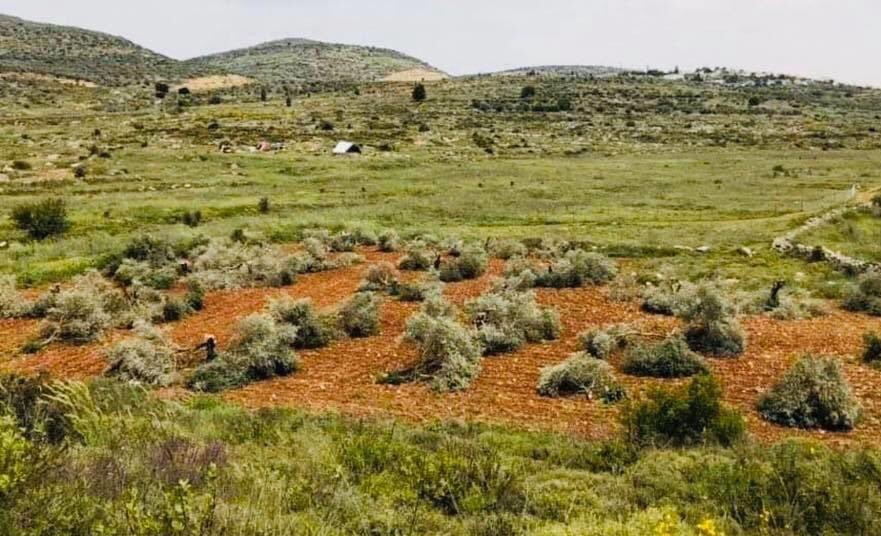Israeli settlers felled some 40 olive trees on Monday, April 27, in the town of As-Sawiya, approximately 10km due south of the West Bank city of Nablus. Ghassan Daghlas, who monitors settlement construction in the northern West Bank, confirmed that a group of settlers from the nearby Israeli colonial settlement of Rechelim chopped down some 40 olive trees belonging to Abdul-Rahman Mohammad Yousef, a local Palestinian farmer.

Dozens of olive trees belonging to a Palestinian farmer. Abdul-Radhman Mohammad Youself, were destroyed by axe-wielding Jewish settlers on Monday, April 27, in this West Bank agricultural field, just outside the town of As-Sawiya, south of the city of Nablus. (Photo: As-Sawyia Municipal Council)
Settler violence against Palestinians and their property is routine in the occupied West Bank and is rarely prosecuted by Israeli authorities. According to a new report by B’Tselem, settlers have ramped up attacks against Palestinians since the Coronavirus crisis started.
The organization has recorded 23 attacks against Palestinians by settlers in the first three weeks of April, which is identical to the total number of attacks recorded in the entire month of March. Eleven of the latter attacks took place in mid-March, after the Health Ministry imposed strict restrictions on movement throughout the country as a means of stemming the spread of the virus.
The number of attacks for both March and April represents an increase of at least 100% compared to figures recorded for January (11) and February (12). These violent incidents saw settlers physically assault Palestinians with clubs, stones, dogs, axes, electroshock weapons and in some cases with firearms, according to B’Tselem. The organization’s report added that attacks included the firebombing of cars, the attacking of homes, the theft of livestock, the felling of olive trees and the uprooting of other crops.
While these incidents occurred throughout the West Bank, there were some areas having a particularly high concentration: the South Hebron Hills, the vicinity of the settlement of Shilo roughly 15km south of Nablus, and the area of the settlement of Halamish approximately 10km north-northwest of Ramallah. In addition, reports detailed almost daily harassment by settlers of Palestinians in the Jordan Valley where Jewish-owned livestock was intentionally grazed on Palestinian agricultural fields.
While one incident was widely reported in the Israeli media, when a group of settlers being transported to a facility for self-isolation attacked Palestinians near the Dead Sea, others were overlooked. Overnight Monday-Tuesday, April 13-14, a group of masked Israeli settlers in the southern West Bank pepper-sprayed and hurled stones at three Palestinian men and firebombed their two vehicles before fleeing the scene. One notable incident that was not widely reported in Israeli media was an April 16 incident when two brothers from the al-Jalazun refugee camp were attacked by settlers and severely injured.
“I could barely protect my head and face from the blows. Someone hit me hard on the mouth and I could feel my front teeth break. Blood started trickling into my mouth and down my face,” one of the brothers told B’Tselem. “I shouted and cried out: ‘For God’s sake, what did I do to you? Do you have no mercy? You are killing me. Have mercy.’ But none of them listened. At some point, I collapsed. I had no strength left. Then they tied my hands behind my back with some rope. The armed settler pointed his gun at my head and cocked it, as if he was going to shoot me in the head. I started reciting the ‘shahada’ over and over: ‘There is no God but Allah and Muhammad is his prophet.’ I thought my time had come to die.”
Rather than being isolated incidents, B’Tselem argues that the violence is a part of a coordinated effort between settlers and Israeli authorities. The report cites that five of eight attacks on Palestinian homes in the month of March took place while soldiers both permitted and participated in the violence.
“This is part of Israel’s strategy to encourage the dispossession of Palestinians from growing areas throughout the West Bank, which paves the state’s way to take over more land and resources. The fact that this violence has exacerbated during a global pandemic adds another layer of brutality to Israel’s policy,” B’Tselem’s report concludes.
Related:


